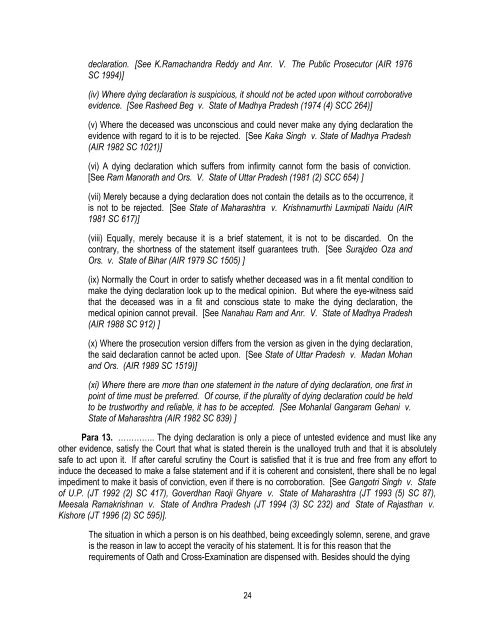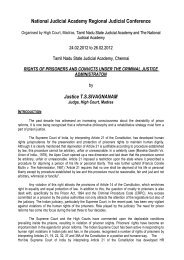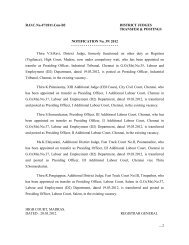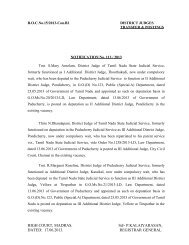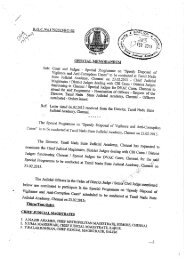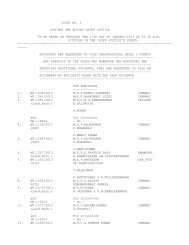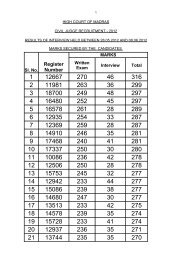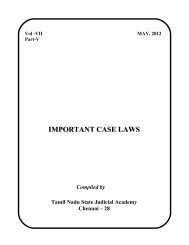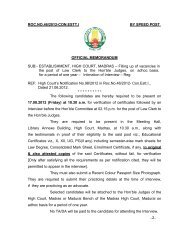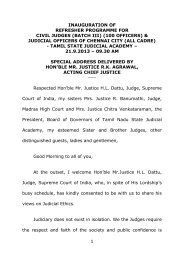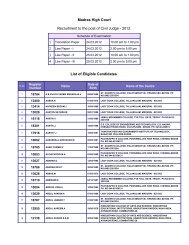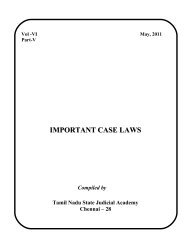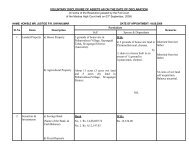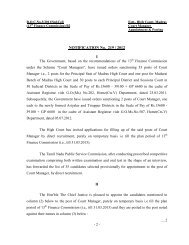Appreciation of Evidence in Sessions Cases - Justice D.Murugesan
Appreciation of Evidence in Sessions Cases - Justice D.Murugesan
Appreciation of Evidence in Sessions Cases - Justice D.Murugesan
You also want an ePaper? Increase the reach of your titles
YUMPU automatically turns print PDFs into web optimized ePapers that Google loves.
declaration. [See K.Ramachandra Reddy and Anr. V. The Public Prosecutor (AIR 1976<br />
SC 1994)]<br />
(iv) Where dy<strong>in</strong>g declaration is suspicious, it should not be acted upon without corroborative<br />
evidence. [See Rasheed Beg v. State <strong>of</strong> Madhya Pradesh (1974 (4) SCC 264)]<br />
(v) Where the deceased was unconscious and could never make any dy<strong>in</strong>g declaration the<br />
evidence with regard to it is to be rejected. [See Kaka S<strong>in</strong>gh v. State <strong>of</strong> Madhya Pradesh<br />
(AIR 1982 SC 1021)]<br />
(vi) A dy<strong>in</strong>g declaration which suffers from <strong>in</strong>firmity cannot form the basis <strong>of</strong> conviction.<br />
[See Ram Manorath and Ors. V. State <strong>of</strong> Uttar Pradesh (1981 (2) SCC 654) ]<br />
(vii) Merely because a dy<strong>in</strong>g declaration does not conta<strong>in</strong> the details as to the occurrence, it<br />
is not to be rejected. [See State <strong>of</strong> Maharashtra v. Krishnamurthi Laxmipati Naidu (AIR<br />
1981 SC 617)]<br />
(viii) Equally, merely because it is a brief statement, it is not to be discarded. On the<br />
contrary, the shortness <strong>of</strong> the statement itself guarantees truth. [See Surajdeo Oza and<br />
Ors. v. State <strong>of</strong> Bihar (AIR 1979 SC 1505) ]<br />
(ix) Normally the Court <strong>in</strong> order to satisfy whether deceased was <strong>in</strong> a fit mental condition to<br />
make the dy<strong>in</strong>g declaration look up to the medical op<strong>in</strong>ion. But where the eye-witness said<br />
that the deceased was <strong>in</strong> a fit and conscious state to make the dy<strong>in</strong>g declaration, the<br />
medical op<strong>in</strong>ion cannot prevail. [See Nanahau Ram and Anr. V. State <strong>of</strong> Madhya Pradesh<br />
(AIR 1988 SC 912) ]<br />
(x) Where the prosecution version differs from the version as given <strong>in</strong> the dy<strong>in</strong>g declaration,<br />
the said declaration cannot be acted upon. [See State <strong>of</strong> Uttar Pradesh v. Madan Mohan<br />
and Ors. (AIR 1989 SC 1519)]<br />
(xi) Where there are more than one statement <strong>in</strong> the nature <strong>of</strong> dy<strong>in</strong>g declaration, one first <strong>in</strong><br />
po<strong>in</strong>t <strong>of</strong> time must be preferred. Of course, if the plurality <strong>of</strong> dy<strong>in</strong>g declaration could be held<br />
to be trustworthy and reliable, it has to be accepted. [See Mohanlal Gangaram Gehani v.<br />
State <strong>of</strong> Maharashtra (AIR 1982 SC 839) ]<br />
Para 13. ………….. The dy<strong>in</strong>g declaration is only a piece <strong>of</strong> untested evidence and must like any<br />
other evidence, satisfy the Court that what is stated there<strong>in</strong> is the unalloyed truth and that it is absolutely<br />
safe to act upon it. If after careful scrut<strong>in</strong>y the Court is satisfied that it is true and free from any effort to<br />
<strong>in</strong>duce the deceased to make a false statement and if it is coherent and consistent, there shall be no legal<br />
impediment to make it basis <strong>of</strong> conviction, even if there is no corroboration. [See Gangotri S<strong>in</strong>gh v. State<br />
<strong>of</strong> U.P. (JT 1992 (2) SC 417), Goverdhan Raoji Ghyare v. State <strong>of</strong> Maharashtra (JT 1993 (5) SC 87),<br />
Meesala Ramakrishnan v. State <strong>of</strong> Andhra Pradesh (JT 1994 (3) SC 232) and State <strong>of</strong> Rajasthan v.<br />
Kishore (JT 1996 (2) SC 595)].<br />
The situation <strong>in</strong> which a person is on his deathbed, be<strong>in</strong>g exceed<strong>in</strong>gly solemn, serene, and grave<br />
is the reason <strong>in</strong> law to accept the veracity <strong>of</strong> his statement. It is for this reason that the<br />
requirements <strong>of</strong> Oath and Cross-Exam<strong>in</strong>ation are dispensed with. Besides should the dy<strong>in</strong>g<br />
24


